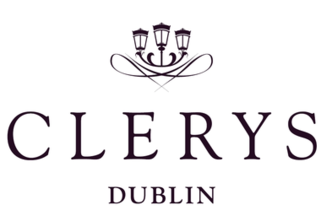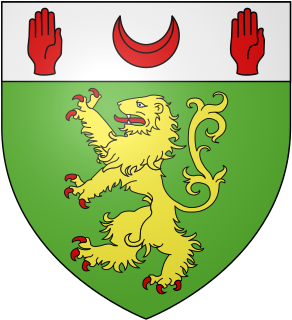Related Research Articles

Clerys was a long-established department store on O'Connell Street in Dublin, Ireland, a focal point of the street. The business dates from 1853, however the current building dates from 1922, having been completely destroyed in the 1916 Easter Rising. Clerys completed a five-year restoration programme in 2004 at a cost of €24 million. A renovation project is in place to bring the building back to its former glory including a new proposed rooftop destination.
Keaveney is an Irish surname, which is an anglicized form of the Gaelic Ó Géibheannaigh, meaning "descendant of Géibheannach". Géibheannach means "fettered". Alternative spellings include Keaveny, Keveney, Keavney, and Kiveney. Related names include Caveney, Kaney, Kevan, Kevany, Kenney, Kenny, Geaveny, Geany, Guiney and O'Guiney.
The surname McAleer is found in County Tyrone, Ulster in Ireland, moving into western regions of Scotland. It is an Anglicisation of the Gaelic Mac Giolla Uidhir or Mac Giolla Uír. It is thought to mean "son of the servant of Saint Odhar". Legend says that Saint Odhar was Saint Patrick's charioteer.

O'Cleary is the surname of a learned Gaelic Irish family. It is the oldest recorded surname in Europe — dating back to 916 CE — and is cognate with cleric and clerk. The O'Clearys are a sept of the Uí Fiachrach dynasty, who ruled the Kingdom of Connacht for nearly two millennia. As Connachta, the O'Cleary's ruled the kingdom of Uí Fiachrach Aidhne for nearly 800 years. They are the descendants of Fiachrae, son of the High King Eochaid Mugmedon, and elder brother of legendary High King Niall of the Nine Hostages. According to legend, they ultimately trace their ancestry back to the mythical Fir Bolg, as well as to Milesius, and consequently to Japheth, son of Noah.
McManus is an Irish surname. It is derived from the Irish Gaelic "Mac Mághnais", in modern Irish "McMaghnuis" which means "Son of Magnus". Its earlier origin is from the Latin "magnus", meaning "great". The Normans used it to honour Charlemange (742–814), as Carolus Magnus. Variant spellings of the name include MacManus, Manus and MacManners. The English form, Moyne, is also found in Ulster. In Scotland it is a sept of Clan Colquhoun.
McCaffrey, sometimes spelled Caffrey or McCaffery, is an Irish surname. It is found mostly in the Counties Fermanagh, Monaghan, Cavan and Tyrone in the north west of Ireland. Ballymccaffrey is a townland outside Tempo in county Fermanagh. The surname is an Anglicised form of the Gaelic names Mac Gafraidh, Mac Gofraidh, which mean "son of Gafraidh", "son of Gofraidh". The Gaelic names are forms of the Old Norse Guðfróðr. Notable people with the surname include:
Hynes is a surname, many examples of which originate as the anglicisation the Irish name Ó hEidhin.
Leahy is an Irish surname, originating in Munster, and now found in Cork, Kerry, Limerick, and Tipperary.
Lucey is an Irish, British, American and Canadian surname. Lucey has two distinct possible origins: of Norman origins derived from Latin personal name Lucius; of Gaelic origins derived from Old Gaelic Ó Luasaigh, anciently Mac Cluasaigh. Alternative spellings are: Lucy, Lucie, Luci, Luce. Lucey is also a toponomastic name in France.
McGillicuddy is a surname of Irish origin, meaning "son of the servant of St. Mochuda". A variant form of the name is Mac Giolla Mhochuda. Other Anglicised forms of Mac Giolla Chuda include MacGillacuddy, MacGillecuddy, MacGillycuddy, MacIllicuddy, MacElcuddy, MacElhuddy and Mac Giolla Coda
Geaney is an Irish surname, the Anglicized form of the Gaelic Mag Éanna, which is derived from the personal name Éanna.

McCartan is a surname of Irish origin. It is the anglicized form of Mac cArtáin of Irish origins. The surname denotes the son of Artán, diminutive of the personal name Art, an old Irish word for "bear". They are the Lords of Kinelarty, a barony in the County Down of Northern Ireland. Kinelarty was at one point in time historically known as McCartans-Country and also Cineal Foghartaich.
McCaughan is a surname of Irish origin. It is an Anglicised form of the Irish language Mac Eacháin, meaning "son of Eachán". The personal name Eachán is diminutive of the personal name Eachaidh, which is derived from each, meaning "horse".
Drennan is a surname of Irish origin and is derived from the Gaelic Ó Droighneáin, Ó Draighnáin, or Ua Draighnen, meaning "descendant of Draighnen", or "descendant of blackthorn". Variant spellings include Drennen, Drenning, Drennon, Drinan, Drinnan, Drinnon, and Drynan. Thornton is another Anglicized surname from the same original Gaelic form.
Mac Coitir and Mac Oitir are masculine surnames in the Irish language. The names translate into English as "son of Oitir". These surnames originated as a patronyms, however they no longer refers to the actual name of the bearer's father. There are specific forms of these surnames that are borne by married and unmarried females. There are numerous Anglicised forms of these surnames.
Mac Amhlaoibh is a masculine surname in the Irish language. The name translates into English as "son of Amhlaoibh". The surname originated as a patronym, however it no longer refers to the actual name of the bearer's father. The form of the surname for unmarried females is Nic Amhlaoibh. The forms for married females are Bean Mhic Amhlaoibh and Mhic Amhlaoibh. The Irish Mac Amhlaoibh has numerous Anglicised forms. The surname has been borne by several notable Irish families that are unrelated to each other.
Ó Cuindlis was the name of an Irish family of brehons and scholars from Uí Maine, located in present-day County Galway and County Roscommon, in Connacht. It means 'descendant of Cuindlis'. It was also spelt with Cuindilis and Cuindleas, later Cuinnlis and Coinlis, and in County Mayo Coinleisc and Coinlisc. The earliest form of the name can be traced back to an abbot from the 8th century, named Cuindles.
McAdam or MacAdam is a Scottish Gaelic clan which originated as a branch of Clan Gregor. As a surname it is most prominent in the Galloway and Ayrshire regions of Scotland. Some of their descendants are also to be found in Ireland, the United States, Australia and Canada.
McMorran or MacMorran is a surname. Recorded as O'Morahan, O'Moran, McMorran, Moran, Morran, Morahan and others, it is possibly of Irish origin. Moran, Morin, and Morain are also recorded in France, Ireland and England.
Carvill or McCarvill or MacCarvill is an Irish surname that may refer to the following people:
References
- ↑ The Surnames of Ireland, Edward MacLysaght, 1985, Irish Academic Press